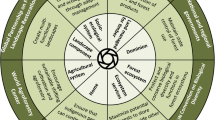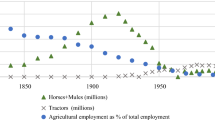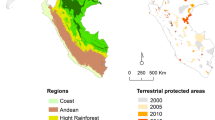Abstract
Concern over massive losses of tropical forest in the Philippines has led to a reforestation program that includes contracts with local community organizations. Two projects are evaluated with respect to the objectives of the program, which were: to reverse deforestation and environmental degradation; to improve the well-being of communities by increasing income opportunities; and, to ensure a sustainable forest-based economic sector. The evaluation, first undertaken four years into the program, was based on information from a variety of sources, including the local community. The assessment highlights the importance of on-going community participation and identifies significant obstacles to meeting the program’s objectives.
Similar content being viewed by others
References
ANGOC (1991).Community participation, NGO involvement and land tenure issues in the Philippine reforestation program. Assessment of the Asian Development Bank-funded contract reforestation in the Philippines. Asian NGO Coalition for Agrarian Reform and Rural Development.
DENR (1993).Department administrative order (DAO) No. 22: Revised guidelines for community forestry program. Manila: Department of Environment and Natural Resources.
Espaldon, V.O. (1995). Deforestation in the Philippines: Human-ecological processes in tropical uplands (unpublished Ph.D. thesis). Guelph, ON: Department of Geography, University of Guelph.
FMB (1988).Philippine-Germany forest resource inventory (RP-G FRI). Quezon City, Philippines: Forest Management Bureau.
Grandstaff, S., Grandstaff, T.B. (1987). Semi-structured interviewing by multidisciplinary teams in RRA.Rapid Rural Appraisal. Khon Kaen, Thailand: Khon Kaen University, 129–143.
Kummer, D.M. (1991).Deforestation in the post war Philippines. Chicago: University of Chicago Press.
Myers, N. (1980).Conversion of tropical moist forests. Washington, D.C.: National Academy of Sciences.
Porter, G., Ganapin, D.J., Jr. (1988).Resources, population and the Philippines future: A case study. The Philippines: World Resources Institute Paper.
Revilla, A.V., Gregorio, M.C. (1983).The COSTEF system: A cost effective reforestation/agroforestation strategy. College, Laguna, Philippines: Forestry Development Center, University of the Philippines at Los Baños.
Seidman, I.E. (1991).Interviewing as qualitative research. New York: Teachers College Press.
Tolentino, D.S., Jr. (1992). The national forestation program: A review of lessons and experiences and formulation of action plans for the second forestry sector project. Paper presented during PENRO/CENRO Convention, 16 November 1992, Quezon City, Philippines.
World Bank (1989).Philippines—environment and natural resource management study. Washington, D.C.: World Bank.
Rights and permissions
About this article
Cite this article
Espaldon, V.O., Smit, B. Community reforestation in the Philippines: An evaluation of community contracts. Knowledge and Policy 10, 34–42 (1997). https://doi.org/10.1007/BF02912485
Issue Date:
DOI: https://doi.org/10.1007/BF02912485




